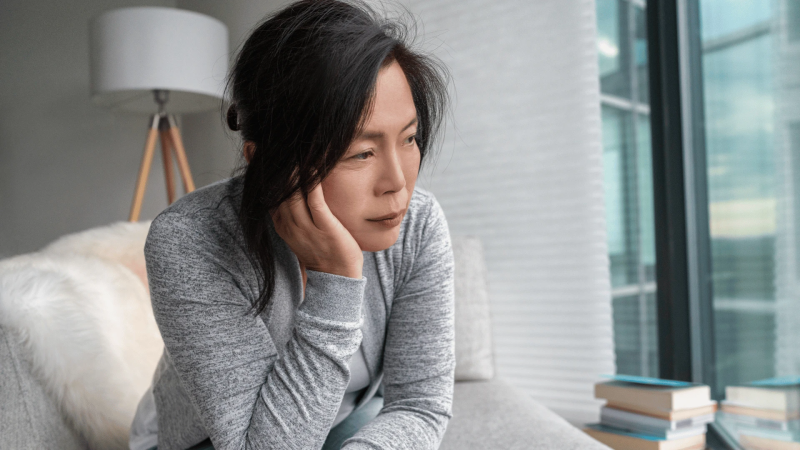In every relationship, there's a need to balance being together as a couple with being independent. The emotional and practical demands involved in sharing a life often overtake people's time and energy. They become intertwined, to the point that they lose sight of themselves as individuals, separate from their identity within their partnership.
Feeling frustrated with your spouse is an inevitable part of marriage, yet the level of discontent shouldn't outweigh your feelings of tenderness. The reasons so many wives are happier when their husbands aren't around are complex, yet they point to the disparities that often exist in a long-term marriage.
Here are 9 reasons so many wives are happier when their husbands aren't around, according to psychology
1. They enjoy having more personal space
 Pro-stock studio | Shutterstock
Pro-stock studio | Shutterstock
Wives revel in having the bed all to themselves and getting a solid night's sleep without their husband elbowing them or stealing the covers. They don't have to share the couch while binge-watching their favorite show. When their husbands are away, wives get to take up more space — literally.
They can leave the clean laundry in a pile next to the dirty laundry. They can eat ice cream straight from the carton without having to share. They can take as much time as they want for their skincare routine, since no one is rushing them out of the bathroom before they've applied their serum.
No matter how much a wife loves her husband, being alone gives her an opportunity to just be. It serves as a welcome reminder of who she is outside of her relationship, which ultimately makes her reunion with her husband even sweeter.
2. They have more freedom in their daily routine
 LightField Studios | Shutterstock
LightField Studios | Shutterstock
Many wives are happier when their husbands aren't around because, for a brief span of time, they aren't beholden to their husband's needs. They appreciate when their husbands are away because it means they get time to themselves, something that many women don't get to have, especially once they become moms.
Even without kids in the picture, wives often center their husband's needs above their own, which is why they're happier when their husbands aren't around. When wives are alone, there's no arguing over who gets to shower first. There's no debate over who puts the coffee on or who should get to eat the last piece of toast for breakfast.
Being on their own means that wives don't have to come up with a meal plan or cook a well-balanced dinner. They can eat "girl dinner" to their heart's content, with no one there to judge them for inhaling an entire plate of olives and finishing it off with more olives.
According to psychologist Leon F. Seltzer, Ph.D., relationships require both a healthy sense of dependency and a healthy sense of independence to nourish both people. Each spouse has to be willing to show vulnerability, hold themselves accountable for their flaws, and hold space for the other person's perspective. They also have to devote time to themselves and do the things that make them feel fulfilled.
Ideally, husbands and wives aim for a sense of interdependence in their marriage, meaning that they commit to the relationship without disregarding their individual purposes. Both people should feel free to focus on their life goals and interests in a way that enhances them while also enhancing their partnership. Feeling a deep need for more personal space doesn't necessarily mean that a marriage is doomed to fail; rather, it shows that time alone is a crucial part of being together.
3. They get time for self-care
 JLco Julia Amaral | Shutterstock
JLco Julia Amaral | Shutterstock
When wives ignore their own needs, they wind up feeling resentful toward their husbands, in a way that can seriously harm the sense of unity in their marriage. Devoting time to self-care can offset that inner turmoil and serve as an avenue for wives to meet their needs and decompress.
Self-care often gets framed as a frivolous activity to take part in, but in reality, true self-care is a key part of staying balanced, mentally and physically. Practicing self-care is about so much more than facials and bubble baths. It's about listening to your body and mind and finding ways to nourish every part of yourself.
As life and career transition coach Deborah Roth explained, "If we don't place ourselves at the center of our lives, we become increasingly scattered, ungrounded, and miserable. If we don't create space for our self-care, we won't be whole enough to take care of all those we love or who depend on us."
Roth shared an approach to self-care that involved viewing it as "a four-sided model of mind, body, heart, and spirit." She asked, "What can you do every day to support and nurture yourself in each area to stimulate your mind, nurture your body, honor your feelings and relationships, and reconnect with your spirit?"
If we don't take care of ourselves, we can't take care of anyone else, either. After all, we can't pour from an empty cup. Yet self-care holds value apart from helping us provide for others. It's absolutely enough to focus on self-care for yourself only, because you are absolutely enough and worth nurturing.
4. They perform less emotional labor
 Antonio Diaz | Shutterstock
Antonio Diaz | Shutterstock
The concept of emotional labor is nothing new, although it's caught fire in recent years, as more conversations around emotional labor are being had in public spaces, including social media. TikTok is full of posts from wives who are tired of being asked to manage their husband's emotions, along with husbands who are trying to understand how they can show up more fully, so their wives don't have to carry that weight all by themselves.
In her book, "Emotional Labor," journalist Rose Hackman explained how the gendered inequity of performing emotional labor harms both men and women. She described emotional labor as "the editing work of emotions that someone would do in order to have an effect on the emotions of someone else" that often gets "offloaded onto women."
Emotional labor is entirely necessary, not just to keep individual relationships functioning, but to keep our overall society functioning as well. "Fundamentally, humans don't just need a roof over their heads or food to eat," Hackman stated. "They need a sense of love, connection, community, and belonging. All humans, regardless of gender, are relational. We all need relationships with other humans to survive."
All too often, women are tasked with the role of caretakers for everyone else's feelings, yet as Hackman pointed out, it doesn't have to stay that way. "Emotional labor is not a bad thing," she emphasized. "It's a wonderful thing. It's a thing that, ideally, everyone should be doing."
Husbands and wives can make the division of emotional labor more even by openly discussing their feelings and how they want their emotional needs to be met. When husbands take more responsibility for their own emotional landscape, they not only free up their wives' capacities, they're able to be more in touch with themselves, which is an empowering and connective way to live.
5. There's less need for negotiation
 Dima Berlin | Shutterstock
Dima Berlin | Shutterstock
So many wives are happier when their husbands aren't around because there's less need for negotiation. They don't have to run every little decision past their husbands to see where they stand. They just get to decide. There's no back-and-forth on who picks the kids up from school or what groceries to buy. Being on their own gives wives an opportunity to call the shots as they see fit.
All relationships require the people in them to compromise at one point or another, which is why knowing how to negotiate with your partner in a grounded and compassionate way is so important.
Dating and relationship coach Tanya Finks shared techniques to help couples navigate the often rocky terrain of negotiating with each other. According to Finks' perspective, the first part of negotiating is to go inward and focus on yourself. She called this part "the stage of reflection."
This stage allows you to "begin to care for yourself by clearing your mind and hunkering to your core," which will lead to the next step: "Deciding what your needs are within the relationship."
Finks advised couples to "focus on cooperation rather than compromise" by figuring out what they need to feel fulfilled, along with what they're willing to let go of in their relationship.
6. They have more opportunities for self-reflection
 Maridav | Shutterstock
Maridav | Shutterstock
A major part of making a relationship work is knowing yourself deeply. Over the course of any marriage, people change. They might not be the same version of themselves who stood at an altar and said vows, yet having a healthy marriage means allowing for each person to change.
Ideally, both halves of a couple change in ways that make them better matches for each other as time goes on. Their goals and interests might transform, but they still align with what their spouse wants.
Relationship expert Dr. Ava Cadell shared that building the life you want means you have to "learn more about what fulfills you," which can only be done by diving deep into yourself and thinking about your past, present, and future.
"Reflection is necessary to grow and evolve," Dr. Cadell explained. "Looking back at your strengths and weaknesses can help you be more aware of what you do well and what you need to work on to reinvent yourself." She concluded, "Gratitude is the most crucial step in your journey to reinvent yourself. Being thankful for all you have will open your heart emotionally and heal your soul."
So many wives are happier when their husbands aren't around, allowing them to relearn who they are, which gives them the perspective they need to show up as their fullest selves in their relationships.
7. They can commit to personal growth
 Luke SW | Shutterstock
Luke SW | Shutterstock
Being committed to one another is a sign that you're in it to win it, yet focusing on your own goals, interests, and capacity for growth is part of what keeps a relationship strong. Wives are happier when their husbands aren't around because they can work on themselves without any distractions.
They can spend time journaling without having to worry about household tasks. They can go to a yoga class without coordinating their schedule with their husband. They can read or paint, or learn a new language. They can put their personal growth first.
Committing to expanding who you are means you have to harness what life coach Debra Smouse called "the mighty power of self-awareness." According to Smouse, self-awareness is "the ability to observe ourselves and understand why we react and how we behave in our lives. Awareness is not only accepting what we discover about ourselves, but it also helps us make informed decisions about the changes we want to make in our lives... It's a tool that allows us to better manage our thoughts, motivations, and emotions."
She shared that being self-aware can give you access to parts of yourself that you didn't know before. Cultivating a sense of self-awareness can bring a deep sense of inner peace, which guides you toward appreciating all that you have.
Self-awareness doesn't only benefit you on an individual level, it can help you show up fully to your marriage. Smouse explained that "Self-awareness allows you to be a better communicator with everyone in your life because you are clear on your personal needs." Knowing yourself better will only make your marriage stronger.
8. They can indulge their guilty pleasures
 Ground Picture | Shutterstock
Ground Picture | Shutterstock
If wives want to spend all weekend horizontal watching rom-roms, no one's going to stop them. If she wants to veg out to makeover shows, there's no need for her to stop watching after one episode because her husband wants to watch a show they both enjoy. In other words, so many wives are happier when their husbands aren't around because they get to be deliriously and deliciously selfish.
Marriages take effort to maintain, along with everything else that takes effort: Working 40 hours a week or parenting or just keeping your head above water as life crashes over you. It feels good to let go of those responsibilities, even if it's just for the duration of your husband's business trip or boys' weekend. You can't be "on" all the time, or else you'll burn out. So, release some of that pressure and really lean into whatever brings you joy.
9. They get to put down the invisible load
 Dima Berlin | Shutterstock
Dima Berlin | Shutterstock
Wives' time apart from their husbands lets them put down the invisible load they're constantly carrying to keep their marriages moving forward. Invisible labor, which is also called cognitive labor, can be described as the mental work involved in keeping your household, family, and relationship afloat. It's entirely essential work, yet it's not compensated, respected, or even recognized.
Allison Daminger, a researcher on the inequity of cognitive labor, discovered that women took on most of the cognitive labor in 80% of the straight couples she interviewed. Her research highlights just how much wives have to think about just to maintain the status quo.
More often than not, wives are the ones who notice there's no milk in the house. They're the ones writing out grocery lists and reminding their husbands to pick up milk. In order for decisions to get made, a person has to anticipate needs, identify ways to fulfill those needs, then choose a course of action and monitor progress.
When their husbands aren't around, wives can take a step back. They can turn down all the noise that comes with consistently worrying. They get to let go of that invisible load, at least for a little while, which is why so many wives are happier when their husbands aren't around.
Alexandra Blogier is a writer on YourTango's news and entertainment team. She covers social issues, pop culture analysis and all things to do with the entertainment industry.



